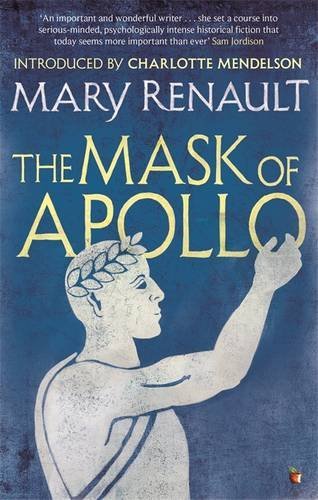What do you think?
Rate this book


404 pages, Paperback
First published January 1, 1966
I thought, Perhaps it is impossible for a philosopher to be a king – at any rate, to be both at once. Perhaps that is only for the goda response to Plato’s The Republic (a work whose precepts very much infuse the novel) with which I heartily concur; not to mention:
We are weary of ourselves, and have dreamed a king. If now the gods have sent us one, let us not ask him to be more than mortal.or
Now he had all which if he had sunk his soul to evil could have made him glad. Old Dionysios had had it and died content. He suffered because he had loved the good, and still longed after it.which both speak to the difficult political realities incumbent upon a king that may render even the best of intentions moot in the end.
It seemed that the god had said to me, “Speak for me, Nikeratos. Someone’s soul is listening.” Someone’s always is, I suppose, if one only knew. Plato never forgot it.




“Men of Peloponnesus and of the confederacy, I asked for your presence here, that you might consider your own interests. For myself, I have no interests to consult while Syracuse is perishing, and, though I may not save it from destruction, I will nevertheless hasten thither, and be buried in the ruins of my country. Yet if you can find in your hearts to assist us, the most inconsiderate and unfortunate of men, you may to your eternal honor again retrieve this unhappy city. But if the Syracusans can obtain no more pity nor relief from you, may the gods reward you for what you have formerly valiantly done for them, and for your kindness to Dion, of whom speak hereafter as one who deserted you not when you were injured and abused, nor afterwards forsook his fellow-citizens in their afflictions and misfortunes.”Here is Ms. Renault’s version of that same speech and narrative:
Before he had yet ended his speech, the soldiers leapt up, and with a great shout testified their readiness for the service, crying out, to march immediately to the relief of the city. The Syracusan messengers hugged and embraced them, praying the Gods to send down blessings upon Dion and the Peloponnesians. When the noise was pretty well over, Dion gave orders that all should go to their quarters to prepare for their march, and, having refreshed themselves, come ready armed to their rendezvous in the place where they now were, resolving that very night to attempt the rescue.
"I have called you here so that you can decide what you think best for you. For me, there is no choice. This is my country. I must go; and if I cannot save her, her ruins shall be my grave. But if you can find it in your hearts to help us, foolish and wretched as we are, you may to your eternal honor still save this unhappy city. If that is too much to ask, then farewell, and all my thanks. May the gods bless you for your past courage, and the kindness you have shown to me. If you speak of me after, say I did not stand by to see you wronged, nor forsake my fellow citizens in disaster."So, not only has she got a lot of chutzpah to take on Plutarch, I think she does a fine job of it. We might attribute much of the stilted nature of that original to the inadequacies of translation and the formality of the time, but even with that in mind her version reads much more smoothly to modern eyes and ears. It trips right off the page as if it’s being spoken aloud. Some folks might not find it as rousing as Shakespeare’s Henry V Agincourt speech, but I’d rank it right up there, especially when you consider that Dion was speaking to free men–or, at least, relatively free men who were prepared to leave, not men in a cornered army, under thumb of their social superiors living under the threat of death should they retire from the field. Shakespeare’s Henry is firing up men in servitude to a king (again, relatively) and whose concept of glory is less pure to modern thought. They will fight or die. Dion’s soldiers are fighting that others might be free, and that’s a tougher sell to the average guy behind a spear....
I don’t think he could have gone on, but the cheering drowned his voice. They yelled his name like a war cry, then shouted, “To Syracuse!” I suppose Hellanikos made a speech of thanks; I think he embraced Dion. I could scarcely see for tears.
To me it seemed that Dion, though a king in exile, was still a king; he might lead no armies, but men would serve him with their minds, for by believing in him they could believe better in themselves.Most people are looking for that.... Tragically, most seem to fall prey (and pray) to less than noble versions of that ideal, and it is that failure that is, I’m sure, at the heart of most human suffering. The tightrope of leadership’s role between selflessness and what we might call self-actualization is at the heart of the Greek philosophical struggle. I honestly can’t say that it is the heart of the modern one.